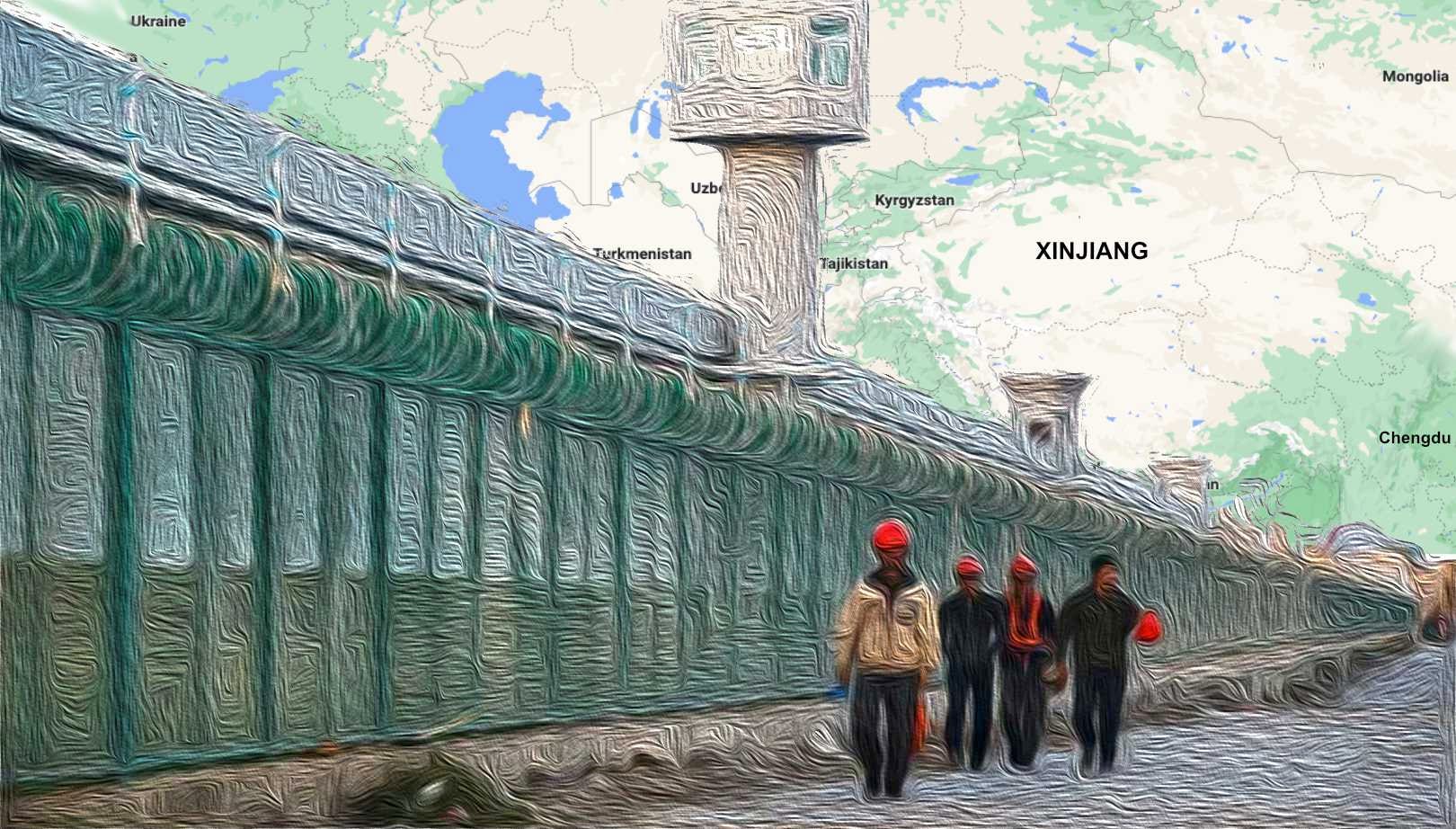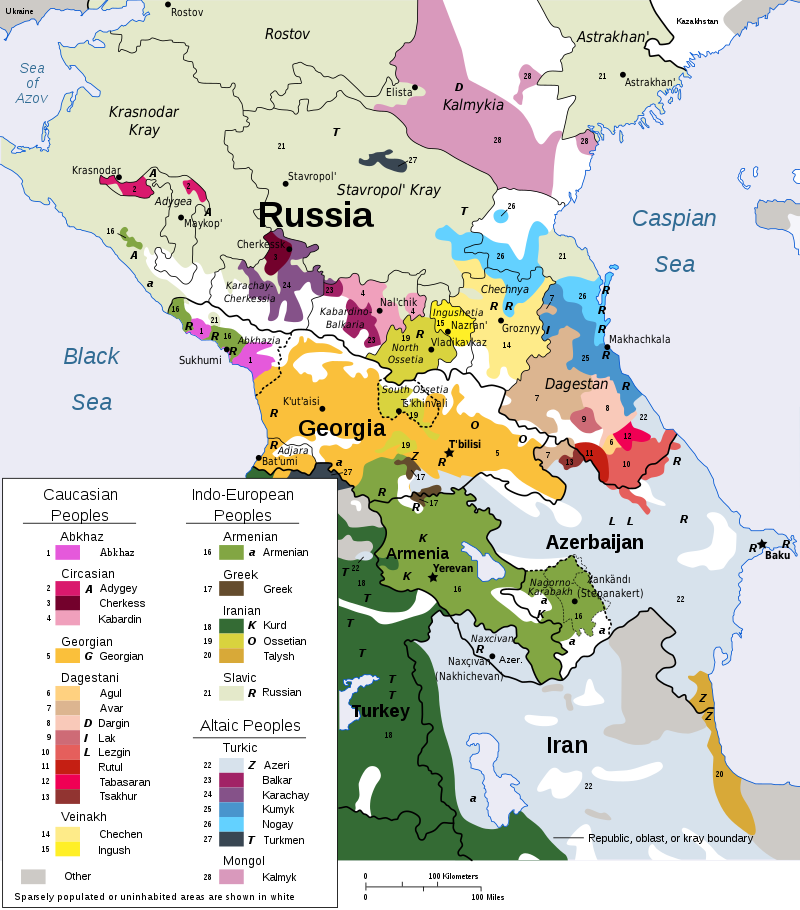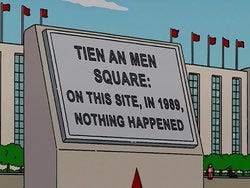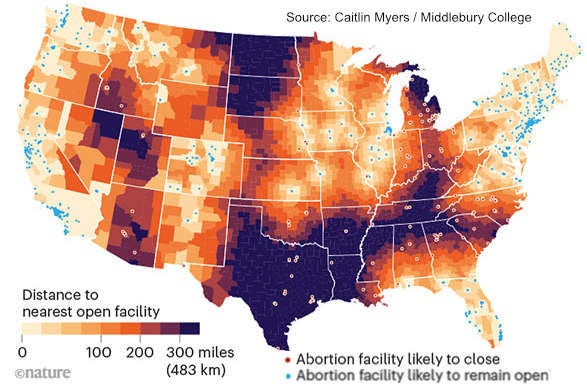The Great Pause Week 90: Sympathy for the Detail
"Sixty million people are involved in some way in separatist movements within China today."
 |
Image after photo by Thomas Peter/Reuters, Vocational Skills Education Center in Xinjiang Uyghur Autonomous Region, 2018 |
When mentioning my trips to China to teach permaculture and ecovillage design, I often encounter a knee-jerk response, wherein my friends feel it necessary for them to bring up the punishment of Uyghurs to even have a conversation of any kind about China. And of course it is impossible to say anything kind about ethnic cleansing and mass detention so I just tend to agree and continue the conversation. Occasionally, I feel a loss of nuance that erodes our shared understanding of things and I will wade in with a deeper analysis. That seldom goes well. There is a purple fog that descends when hypnotic triggers implanted by popular culture are squeezed.
Given the way digital media has been accelerating and amplifying civil discord, and how that has been profitably weaponized by various governments and non-state actors, I don’t think losing nuance is a good idea. Illiberality is dangerous. Indulge me for a moment in my digression.
In China, tensions had been growing — driven in part by the universality of smart phones and apps like WeChat — between the Confucian majority and the Muslim minority in Xinjiang province, formerly East Turkestan, a stone’s throw from all the other ’Stans. There is nothing remarkable in that, and ethnic predjudices go back to the Great Golden Horde. This is just your usual tribal allegiances, with their racism and religious bigotry, topped off with a cherry bomb of violent fundamentalism. It spilled over into bloodshed in July 2009, in riots led by Sunni Muslim Uyghurs in Ürümqi, capital of Xinjiang, when 197 ethnic Han Chinese died, with 1,721 others injured, and again on March 1, 2015, when Uyghurs took their frustrations out by murdering 31 Han and wounding more than 140 with knives and machetes in a bloody rampage in the southwestern city of Kunming, capital of Yunnan, far from the Uyghur homeland.
The mention of machetes brings to mind the Tutsi and Hutu reciprocal genocides in Rwanda 1994, deaths estimated: 491,000–1,006,354, or Bosnia ’92-’95 with 104,732 casualties, spread among Bosniaks, Croats and Serbs. I also remember the deaths of over 331 people, including 186 children, in the 2004 school siege by Sunni Muslim Chechen separatists in North Ossetia and the 2002 Moscow theater attack that ended with 117 hostages and 50 Chechens killed by Russian special forces.
In the United States, tensions had been growing — driven in part by the universality of smart phones and apps like Facebook, Twitter, and Instagram — between a poorly educated Christian white majority and black, latino and Asian minorities, together with a wealthier corporate elite that institutionally keeps disadvantaged, poorly educated factions down for its own benefit, without even thinking about it. Control primarily resided in coastal cities while discontent grew and festered in heartland flyover states, exploited to political advantage by unscrupulous blowhards and the algorithm manipulation businesses of third parties, foreign and domestic.This is, again, your usual tribal allegiances and religious fundamentalism, but in 2021, doused with the accelerant of data-directed, eyeball-harvesting, trillionized social media, it spilled over into violence. On January 6, an aggrieved group of white MAGAdiots took revenge for a foregone election loss by storming the Capitol and murdering and wounding police with bats, lances and tasers in a bloody uprising in the District of Columbia.
The two countries reacted very differently. In China, the president called for “all-out efforts” to “prevent Xinjiang’s violent terrorist activities from spreading to the rest of China.” China would not become Rwanda, or India-Pakistan. He said that violent acts had already spread to other regions of China and could grow like a virus unless checked. He called for “a crushing blow to buy us time.”
Across the Xinjiang border in Pakistan, in otherwise school-less regions, 40,000 Sunni madrasas funded by Saudi Arabia train physicians, administrative officials, judges and teachers with Deobandi and Wahhabist versions of sectarian Islam, including a militant view of jihad. Expansion of madrasas into Afghanistan during the 1980s contributed to the rise of the Taliban, where the Afghan fighting season coincided with Pakistan madrasas’ Spring Break. This has to concern Beijing. Kandahar was not Cancún. Beer bongs and wet t-shirt contests never really caught on.
President Xi Jinping was not keen on reviving the re-education and detention camps of the Cultural Revolution. Many of his closest advisors were camp survivors from that era and strongly opposed such measures. Xi called for reform through education, but left open to interpretation by local authorities how to go about that. Hardliners, led by Party Secretary Chen Quanguo, started rounding up Uyghurs and building “education centers” that resembled massive prisons. Xi could try to distance himself, but as supreme leader, it was on him.Xi also fell back on the policy used by his predecessors in Tibet to deal with “imbalances in the distribution of the ethnic population.” It was the same policy employed after the Jacobite rebellion of 1745 in the conquest of Scotland and Ireland and by Josef Stalin in the resettlement of populations from the Baltics — separate families from their connection to their lands and pack them off to the Chinese equivalent of Siberia or Saskatchewan — the sweatshops of Shenzhen — and then resettle the Western region with 300,000 Han from Eastern China. It was a cultural blender approach to break apart the tribes, just as the Dukes of Argyll broke apart the highland clans. If Sharks started marrying Jets, Xi hopes, West Side Story could have a happy ending.
One could contrast China’s approach with that of Gandhi’s India or post-war Transjordan, where ethnic divisions led to national partition. At present the Balkanization of the West Bank and Gaza is a transition step towards eventual assimilation of all Palestine into a Jewish Caliphate, with apartheid just a growing pain— a low-budget version of re-education centers. Resettlement of populations is done voluntarily, by enticing wannabe Israelis, recruited from orthodox sects, to make Aliyah.
In the United States a few small fish were netted by the FBI and given short jail sentences for the attack on the Capitol. Congressional investigations were begun, but were emasculated by the minority party and will likely be disbanded after the midterm elections. Polls suggest the country is even more divided now than it was in January, with a majority of Republicans saying they would vote for Donald Trump and think the normal primary election season should just be suspended so he can be proclaimed their candidate. There is a substantial minority who feel those arrested for the Capitol attack are patriots who do not belong in jail at all. In contrast to the Chinese policy of “de-extremification,” social media in the United States, including cable news, continue to polarize the population. The right is portrayed by the rightward media as beleaguered, oppressed and endangered and needing to stand up and fight. It is 1859 in America, pre-John Brown’s raid.
Polarization extends along the same political and demographic lines into
vaccination mandates — giving new life to the Covid pandemic through
the 60 million adamantly unvaccinated USAnians (not coincidentally the
same number of vaccine doses the US has promised to release for use in
the undervaccinated 2/3 world). Equally polarized are opinions about
critical race theory, gun control, abortion, religious instruction in
public school, active shooter drills, the prison industrial complex,
access to health care, or the rewriting of history. Tribal polarization
gnaws away at the bare bones of civil discourse, even in the halls of Congress,
until it regurgitates spontaneous outbursts of random violence like
school and workplace shootings or cars driving through crowds of
innocent people.
 |
Separatist regions of China |
Sixty million, coincidentally, is also the number of people involved in some way in separatist movements within China today, in 2021. If you are a hawkish hegemon in Foggy Bottom, you might want to clandestinely encourage the independence campaigns in East Turkestan, Tibet, Inner Mongolia, Hong Kong and Macau. If you are their counterpart in Russia or China, you might feel a need to counter that by unloosing a few hackers to sow discord in the “United” States. Cyberwars are not limited to the big three, however. Anyone can join.
So I ask, which policy makes more sense? Forced homogenization or unlimited polarization? To tribe or to untribe? China and the US are taking very different approaches. It is a vast social experiment on a grand scale. Unless you like sleeping with a machete under your pillow, you might want to rethink the Vocational Skills Education Centers in Xinjiang.
The COVID-19 pandemic has destroyed lives, livelihoods, and economies. But it has not slowed down climate change, which presents an existential threat to all life, humans included. The warnings could not be stronger: temperatures and fires are breaking records, greenhouse gas levels keep climbing, sea level is rising, and natural disasters are upsizing.
As the world confronts the pandemic and emerges into recovery, there is growing recognition that the recovery must be a pathway to a new carbon economy, one that goes beyond zero emissions and runs the industrial carbon cycle backwards — taking CO2 from the atmosphere and ocean, turning it into coal and oil, and burying it in the ground. The triple bottom line of this new economy is antifragility, regeneration, and resilience.
Help me get my blog posted every week. All Patreon donations and Blogger subscriptions are needed and welcomed. You are how we make this happen. Your contributions are being made to Global Village Institute, a tax-deductible 501(c)(3) charity. PowerUp! donors on Patreon get an autographed book off each first press run. Please help if you can.
#RestorationGeneration #Regenerosity
“There are the good tipping points, the tipping points in public consciousness when it comes to addressing this crisis, and I think we are very close to that.”
— Climate Scientist Michael Mann, January 13, 2021.
Want to help make a difference while you shop in the Amazon app, at no extra cost to you? Simply follow the instructions below to select “Global Village Institute” as your charity and activate AmazonSmile in the app. They’ll donate a portion of your eligible purchases to us.
How it works:
1. Open the Amazon app on your phone
2. Select the main menu (=) & tap on “AmazonSmile” within Programs & Features
3. Select “Global Village Institute” as your charity
4. Follow the on-screen instructions to activate AmazonSmile in the mobile app





Comments
Neither choice is particularly appealing, but it's not really an individual choice, either. The most powerful get to decide.
If power coincides with a majority of the population, homogenization follows (perhaps including genocide). If power coincides with a minority, we get polarization (perhaps including apartheid).
All of these choices are old history, but carry tribalism decisions up to the level of nuclear-armed nation states and watch out!
https://www.energy.gov/policy/energy-earthshots-initiative
In both Tibet and Xinjiang, China has pushed into fragile ecosystems whose human populations understood how to live in balance in those ecosystems, disrupted the local human cultures and ecosystems, and flooded the areas with large numbers of Han Chinese whose more upscale (than the native people's) lifestyles demand massive imports of food, energy, and material goods. This is cultural imperialism and settler colonialism on a scale that surpasses Israel's destruction of Palestinian communities and comes close to what we have done here in the US.
The sane, but unlikely, answer to what China has done to its neighbors is for China to back out and let Tibet and let the people of Tibet and Xinjiang have their countries back, aided by reparations from China for the incredible damage they have done.
But that does not mean that China, Xinjiang, and Tibet can't co-operate on common goals, like lessening the effects of climate change and preparing for the impact that will occur.
Here in the US, things are much more complex. While China's problems are in border areas it's the center of the US that is, from your point of view, and mine, and the populations of our western and northeastern coasts, problematic--and vice versa. Should we be setting up Xinjiang-style "education centers" in Tennessee, North Dakota, etc.? I think that would definitely bring the machetes out. What if the North Dakotans, etc. decide to set up "education centers" for Tennesseans like you and me?
, The situation in the US is also complicated because climate change is one of the main issues that divides people. Well, maybe not--the Uighurs and Tibetans are painfully aware of the impact that climate change, abetted by Chinese exploitation, is having on their homelands, while the Chinese don't seem to mind at all. Here in the US, on the other hand, we have a lot of people who, even though they are feeling the effects of climate change, are vigorously denying that it's a problem. The main opposition to them, politically, comes from the Democrats, who practice a different kind of climate denialism--they deny that the steps they are taking to abate climate change are woefully inadequate.
And how this struggle between the willfully ignorant and the woefully inadequate will play out, I don't know. I think national disintegration, de facto if not de jure, is a distinct possibility. But I'm keeping my machete in the toolshed, thank you.